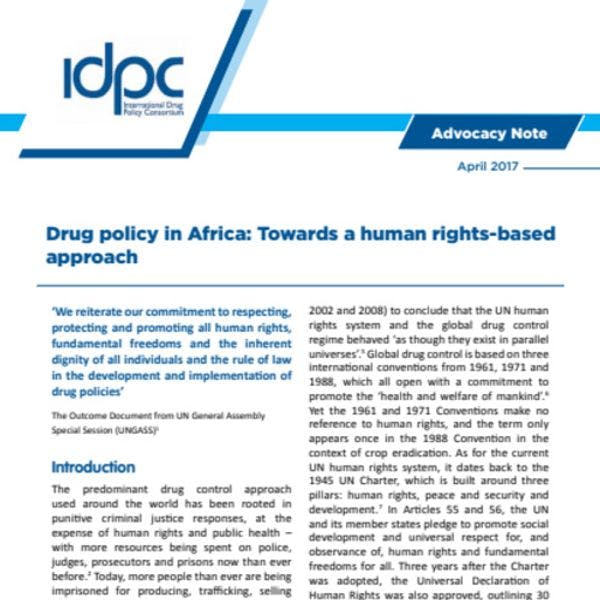Políticas de drogas en África: Hacia un enfoque basado en los derechos humanos
El IDPC insta a los líderes africanos a adoptar una respuesta equilibrada a las drogas con el fin de honrar sus compromisos regionales e internacionales en materia de derechos humanos. Más información, en inglés, está disponible abajo.
Suscríbase a las Alertas mensuales del IDPC para recibir información sobre cuestiones relacionadas con políticas sobre drogas.
The predominant drug control approach used around the world has been rooted in punitive criminal justice responses, at the expense of human rights and public health – with more resources being spent on police, judges, prosecutors and prisons now than ever before. Today, more people than ever are being imprisoned for producing, trafficking, selling or using drugs, and yet the problems remain unsolved: in the world today, there are more producers and consumers of drugs than ever before. The UNODC has openly identified a number of ‘unintended negative consequences’ of the so-called ‘war on drugs’, including severe human rights violations directly related to the criminalisation and stigmatisation of people who use drugs and vulnerable people involved in illicit drug production and trafficking.
This situation has led Paul Hunt (the UN Special Rapporteur on the right to health between 2002 and 2008) to conclude that the UN human rights system and the global drug control regime behaved ‘as though they exist in parallel universes’. Global drug control is based on three international conventions from 1961, 1971 and 1988, which all open with a commitment to promote the ‘health and welfare of mankind’. Yet the 1961 and 1971 Conventions make no reference to human rights, and the term only appears once in the 1988 Convention in the context of crop eradication. As for the current UN human rights system, it dates back to the 1945 UN Charter, which is built around three pillars: human rights, peace and security and development. In Articles 55 and 56, the UN and its member states pledge to promote social development and universal respect for, and observance of, human rights and fundamental freedoms for all. Three years after the Charter was adopted, the Universal Declaration of Human Rights was also approved, outlining 30 universal rights that set ‘a common standard of achievement for all peoples and all nations’. Several decades later, in 1981, the African Charter on Human and Peoples’ Rights (also known as the Banjul Charter) was agreed, and has since been ratified by every African country except South Sudan. The Banjul Charter outlines more than 20 rights.
Current drug policies in Africa continue to be very repressive, with the widespread marginalisation and treatment of people who use drugs as criminals, morally weak ‘addicts’ and/or social outcasts; while non-violent lowlevel drug offenders generally make up the largest share of those sent to the criminal justice system. This approach has often exacerbated human rights abuses, such as ill-treatment and extortion by police, mass incarceration and arbitrary detention, in many cases without trial or due process. In recent years, the media in Ghana, Liberia and Sierra Leone have documented incidents of people who use drugs being killed or injured by police officers during raids.
These issues require urgent redress across Africa. Both ECOWAS and the African Union have developed action plans on drugs which highlight the need to respect, protect and fulfil human rights. This IDPC advocacy note attempts to provide a non-exhaustive overview of how current drug policies violate universal human rights, and what a rights-based approach to drug policy looks like in practice, based on the Banjul Charter.
Keep up-to-date with drug policy developments by subscribing to the IDPC Monthly Alert.
Descargas
Perfiles relacionados
- International Drug Policy Consortium (IDPC)
